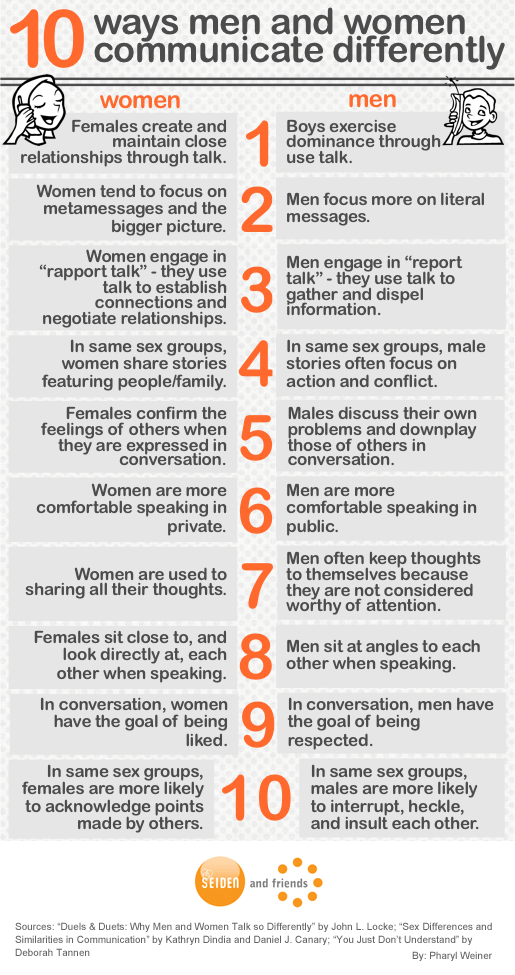Differences in Communication Between Men & Women

Generally speaking, men and women have different communication styles. If you want to learn more about those styles, you’ve come to the right place. This article breaks down how those different styles play out in the workplace, in relationships, and in domestic life. Then, we dive into the science that helps explain these differences.
Please keep in mind that the behaviors described in this article are generalizations. A man may display some of the behaviors thought of as typical of women and vice versa and of course, everyone is different – none of us are easily bundled into just one or two types, or groups, of people.
5 Common Differences in the Workplace

In professional settings, men and women use different communication strategies to achieve their goals. According to Dr. Beth Banks Cohn and Roz Usheroff, these strategies can sometimes lead to misunderstandings between the genders. Some examples include:
#1 Playful Antagonizing
Men often engage in trash talk, such as teasing. In moderation, this can be a helpful bonding tool. However, for women, this behavior can appear hostile and overconfident.
#2 The Know-it-All
Men often avoid asking questions, fearing that doing so diminishes their perceived power. Women often see this as “childish and even arrogant.”
#3 Keeping it to Yourself
Many men avoid giving or soliciting feedback. Women may view this as a sign of men being uncaring.
#4 We’re All Equals
Women typically place a high value on equality. This means they try to make other people feel worthy for their contributions. Men may view this as a sign of weakness.
#5 Everyone’s on the Same Page
Women frequently try to make sure everyone has the same understanding of a situation before making a decision. They also take care not to appear pushy. Men may view these behaviors as indicators of indecisiveness.
Is there a Common Solution?
For a productive workplace, Cohn and Usheroff recommend adopting a middle ground. For example, a workplace culture that promotes constructive feedback can be very helpful for making men feel more comfortable with it. Meanwhile, the ability of women to foster collaboration is worthy of praise, but women in leadership positions should also feel free to take decisive action.
Dr. Carol Kinsey Goman offers additional advice at Forbes.com and suggests that for people to be the most effective communicators possible, they need to blend the strengths of feminine and masculine styles.
Differences Between Boyfriends & Girlfriends

In romantic relationships, boyfriends and girlfriends tend to communicate differently. Writer Lucy Vinestock has highlighted several communication differences between men and women. While Vinestock wasn’t specifically writing about relationships, these behaviors can have a big effect on how a boyfriend and girlfriend interact.
3 Noticeable Differences
- Women tend to apologize more often, which can signal weakness to men.
- Men tend to compliment others less often than women.
- Men focus on fact-based conversations that can end abruptly, while women tend toward extended conversations about complex, often emotional topics.
If you’re having difficulty communicating with a romantic partner, try keeping these general differences in mind. For instance, a man who ends conversations too abruptly may make his girlfriend feel unheard.
Differences Between Husbands & Wives

After marriage, men and women continue to display different communication preferences. This often comes out in the realm of decision making between married couples, as explained by Dr. Susan Heitler for Psychology Today. Men tend to prioritize quick decisions and solutions. To women, this can cause annoyance, because women prefer to spend more time collecting and discussing information. On the flip side, a man may make a quick decision, but if his wife rejects it in favor of more data collection and discussion, he may feel undercut and rejected.
Dr. Heitler points out that putting the strengths of each approach together can lead to great, productive decisions. For instance, Dr. Heitler recommends that men engage their wives in discussion and ask if there are any concerns they haven’t covered yet before the couple reaches a final decision. Additionally, these discussions should remain “calm, respectful,” and even “playful.”

Image source: tumblr.com
The Science Behind the Differences
Some studies have suggested that there are biological underpinnings behind these differences – that is, men’s and women’s brains simply work differently. For instance, researchers have found that women excel in most types of verbal communication and they can also make better use of long-term memory. Women also store more vivid emotional memories, in general.
The authors Barbara Annis and Richard Nesbitt have delved into the topic of gender differences. As recapped by the writer Vanessa Van Edwards, Annis and Nesbitt came to some interesting conclusions:
#1 The Anterior Cortex is Larger in Women than Men
This can lead to more time spent ruminating and processing for women than men. In turn, that is related to women who can show more sensitivity while making decisions.
#2 Women’s Brains Feature a Larger Corpus Callosum
This leads to less linear thinking than men. This means that the typical male brain might be better at focusing on a single project, while a woman’s brain might be better at making connections.
#3 Testosterone Has a Much Different Effect on Men than Women
Men lose testosterone when they experience a setback, but they gain it when they experience success. This might explain why men often seek solitude after a challenging day. This can appear churlish or standoffish to women who prefer socialization and verbalization of their thoughts.
Conclusion
Though men and women communicate differently, it is important to keep in mind that one way is not better than the other, according to the American Psychological Association. Knowledge of these differences should be used to foster understanding rather than fuel prejudices. For instance, in the workplace, quick decision making (a stereotypically male trait) and taking the time to analyze a situation (a stereotypically female trait) are both valuable qualities. In relationships, partners can keep each other’s general communication traits in mind when making decisions and supporting one another.
Additionally, as covered by the BBC’s website, research has suggested that gender can affect differences in personality, but not to the extent that communication becomes impossible. There are also gray areas. For example, findings on gender differences vary from study to study; however, there are still large areas of overlap. As one researcher put it, men and women are more alike than dissimilar.
If you read this article for help assessing your own communication style, keep in mind that everyone falls on a spectrum. You may have certain feminine or masculine communication traits regardless of your gender. The important thing is to understand your own communication preferences and approach the preferences of others with empathy.
Do you communicate effectively? If not, discover how communication is an important aspect on one’s image. If so, have you considered a career in image consulting? You may just find that it’s the perfect career path for you.
Contact Us